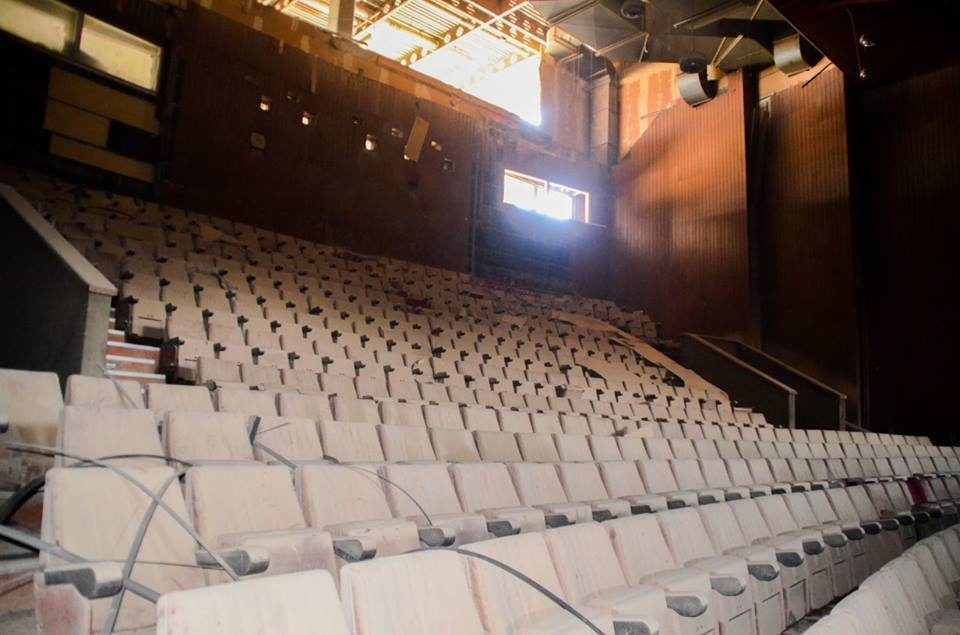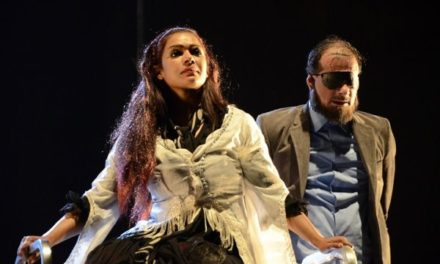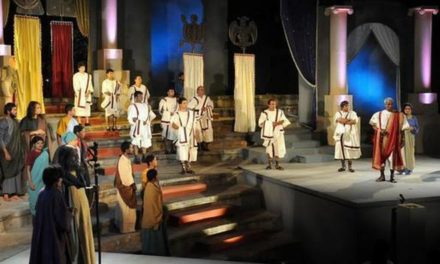In Baghdad’s Salihiya neighbourhood, a group of volunteers is staging a different kind of protest. They have cleaned up a deserted theatre and started performances there again.
Rows of empty seats coated in dust are the first thing one sees upon entering Baghdad’s Al Rashid theatre – it is a relic that has survived in a country whose cultural heritage has been eroded by consecutive wars. For over a decade, the theatre has been shuttered, after falling victim to coalition airstrikes in 2003.
But it has not crumbled away. Today the theatre, situated in central Baghdad, is no longer vacant. A band of local volunteers – film enthusiasts and artists – have embarked upon a renovation project to revive the ghost theatre. Project director, Ahmad Mousa, told NIQASH that the campaign had attracted volunteers “from a diversity of cultural and artistic backgrounds, who heard about the restoration effort on social media, or through their universities”.
As Iraqi artist Qassem al-Mallak complained to Al Baghdadiya TV recently, Baghdad has already lost two of the city’s most important theatres – the Al Mansour and the Al Ihtifalat – as they are located within the Green Zone, a fortified area that houses politicians, security advisors and embassies. Only by obtaining special permission can ordinary civilians enter.
The core team for the Al Rashid renovation was enlisted through Iraq’s Ministry of Youth and Sports but as news of the campaign spread, other locals have also joined in. Those involved are united in their common aim to see the Al Rashid restored to its former glory and to nourish a past Iraqis reverently discuss but which not all have experienced.
In fact, the restoration plan is not a recent initiative. As Mousa explains, it had been placed on hold for over a decade without the necessary funds from the state to activate it.
“We patiently waited for governmental backing, but 13 years of waiting has taken its toll on the abandoned site, transforming it into a dumping ground where trash has been accumulating,” he says.
The doors of the Al Rashid first opened in 1981. Performances by Iraq’s National Symphony Orchestra and during the Baghdad Arab theatre festival attracted the biggest number of spectators. “Their musical magic still rings in my ears,” recalls one local. “It was beautifully decorated and not a single seat remained empty.”
After the 2003 US-led invasion of Iraq, the savagery of war left the Al Rashid heavily battered and violated by looters. The war left little intact, erasing even the photographic evidence that could have informed the world about the artistic sophistry of those times.
To bring even a little of the colourful atmosphere back, volunteers had to clear away mounds of rubbish and debris and hose down surfaces where layers of dust had settled. The stage floor had to be repaired as did lighting equipment. Mousa describes the efforts as “meticulous and continuous”, saying that volunteers have come a long way, transforming the site in just one week.
As one volunteer put it, “we’re not seeking to rebuild Al Rashid from scratch, we don’t have the money. We have done our best to breathe life back into the theatre.”
The cleanup operation, Mousa asserts, will resurrect the souls of artists and musicians, “as their souls migrate through time. They hold the key to our understanding of ourselves, and it is incumbent upon us all to participate in this cultural effort.”
The first theatre play, directed by Iraqi playwright and actor Sami Abdel-Hamid, is set to begin this week.
The neighbourhood of Salihiya where Al Rashid is located is generally considered safe, with no recent history of suicide blasts. But against Iraq’s violent backdrop, there is nothing to guarantee the theatre’s security, not for the building or the lives of those it may attract. Mousa insists that the situation in Iraq is better today than in preceding years. “Iraqis have become accustomed to risks…this is partly down to the increase of security measures and security forces around the capital.”
The years the site was derelict reflects a lack of state concern for the arts in Iraq. The current security crisis means that local arts and culture must remain on the back burner. Yet Iraq’s creative minds are defying expectations. Defiance is not limited to the streets of Baghdad where thousands have been protesting for the past five months. The resurrection of the Al Rashid demonstrates how theatre, and the arts more generally, empower Iraqis – allowing them to respond meaningfully to their situation.
This article was originally published on Niqash.com. Reposted with permission. Read the original article.
This post was written by the author in their personal capacity.The opinions expressed in this article are the author’s own and do not reflect the view of The Theatre Times, their staff or collaborators.
This post was written by Nazli Tarzi.
The views expressed here belong to the author and do not necessarily reflect our views and opinions.


















